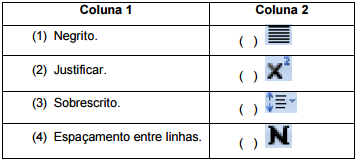Questões de Concurso
Para if-sp
Foram encontradas 1.803 questões
Resolva questões gratuitamente!
Junte-se a mais de 4 milhões de concurseiros!
Cidadezinha qualquer
Casas entre bananeiras
Mulheres entre laranjeiras
pomar amor cantar.
Um homem vai devagar.
Um cachorro vai devagar.
Um burro vai devagar.
Devagar... as janelas olham
Eta vida besta, meu Deus.
(Carlos Drummond de Andrade)
Cidadezinha qualquer
Casas entre bananeiras
Mulheres entre laranjeiras
pomar amor cantar.
Um homem vai devagar.
Um cachorro vai devagar.
Um burro vai devagar.
Devagar... as janelas olham
Eta vida besta, meu Deus.
(Carlos Drummond de Andrade)
Assinale a alternativa que indica, respectivamente, o sentido correto das abreviações:
* - § - p.us.
Assinale a alternativa que preenche corretamente as lacunas:
__________Senhoria está preocupado? (falando com a pessoa)
__________Excelência disse, através da imprensa, que não faltaria óleo de soja ao consumidor. (falando sobre a pessoa)
Vossa Senhoria está _____________. (dirigindo-se a um homem)
Sua Majestade ficou _____________. (falando de uma rainha)

A tabela abaixo criada em LibreOffice 3.5 é utilizada para calcular o Valor Total do produto 1 referente a célula D2:

A fórmula utilizada para o cálculo do Valor Total é
Observando a planilha abaixo desenvolvida em Microsoft Excel 2007, qual seria o valor da célula B4 se em seu conteúdo existisse a seguinte formula = B2*5-A3+B1?
